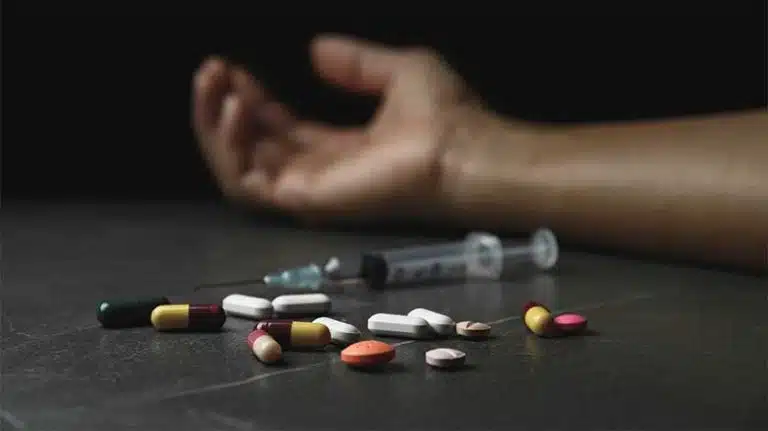Accidental Drug Overdose Vs. Intentional Drug Overdose
- Drug Overdose Deaths
- Accidental Overdose
- Preventing Accidental Overdoses
- Intentional Overdose
- What To Do

A drug overdose is a medical emergency in which a person takes too much of a substance and experiences life-threatening symptoms.
In 2021, the United States overdose death toll reached a record-breaking 100,306. While many of these deaths were accidental, others were intentional. Here are the main differences between accidental and intentional drug overdose.
Drug Overdose Deaths
Both accidental and intentional drug overdoses can involve various substances, including:
- alcohol
- benzodiazepines
- cocaine
- methamphetamine
- prescription drugs used to treat ADHD
- prescription opioid painkillers like oxycodone, hydrocodone, and hydromorphone
All of these substances can cause life-threatening symptoms.
Accidental Drug Overdose
An accidental drug overdose (also called an unintentional drug overdose) is an overdose that occurs by accident. It often happens when someone accidentally takes a drug not prescribed for them. For example, a curious child might ingest a parent’s prescription pills.
Accidental overdoses can also occur in people who struggle with substance abuse. For instance, they might buy illicit drugs that have been laced with more powerful substances, such as fentanyl.
Fentanyl is a synthetic opioid that’s up to 50 times stronger than heroin. It poses an extremely high risk of overdose. According to the Centers for Disease Control and Prevention (CDC), over 150 people die each day from overdoses involving fentanyl and other synthetic opioids.
In addition, many overdoses occur when people recovering from drug addiction relapse. When you get sober, your body becomes much more sensitive to drugs. If you relapse using the same dose of drugs you used at the height of your addiction, you face a high risk of a deadly overdose.
Preventing Accidental Overdoses
To prevent an accidental overdose, it’s important to take your prescription medications exactly as prescribed. Also, store your medications in locked containers out of the reach of children.
In addition, you should avoid all forms of illegal drug use. If you feel unable to do so, seek help at an addiction treatment program. If you cannot access treatment yet, you can lower your risk of deadly overdose by:
- never using drugs alone
- using smaller amounts of drugs
- getting the medication naloxone (brand name Narcan), which is an opioid antagonist that can quickly reverse the effects of an opioid overdose
- testing all your drugs with fentanyl test strips, which you can find online or at harm reduction centers
While these strategies can decrease your risk of overdose, they do not offer full protection. That’s why it’s important to seek treatment for your addiction as soon as possible.
Intentional Drug Overdose
An intentional drug overdose is an overdose that occurs as an act of self-harm or suicide. Common risk factors include:
- mental health conditions, such as depression, bipolar disorder, or schizophrenia
- stressful life events, such as a serious illness, job loss, or the death of a loved one
- social isolation
- previous suicide attempts
In 2020, about 5% to 7% of drug overdoses were recorded as intentional.
However, the actual percentage is probably higher, as it can be difficult to identify the actual cause of an overdose death. According to the National Institutes of Health, women are more likely to intentionally overdose than men.
In recent years, the intentional overdose death rate has declined among most Americans. However, it has increased among non-Hispanic Black women, teenagers, and the elderly.
Preventing Intentional Overdoses
To prevent an intentional overdose, seek help for any mental health conditions or stressors that make you want to hurt yourself. You can start by sharing your concerns with a trusted friend or family member.
In addition, you can reach the national Suicide & Crisis Lifeline by calling or texting 988 or using their online chat.
You should also seek professional treatment by contacting your health care provider or mental health professional. Depending on your needs, your treatment plan may include:
- therapy
- medications
- support groups
- wellness activities like exercise, meditation, and journaling
Finally, if you live with drug addiction alongside another mental health condition, you should attend a dual diagnosis treatment program.
These programs offer personalized, evidence-based treatments for addiction as well as other mental health concerns. Getting treated for all of your mental health conditions at once can significantly reduce your risk of overdose.
Treating A Drug Overdose
Whether accidental or intentional, all drug overdoses require immediate treatment. If you think you or someone you know is overdosing, call 911 right away.
The dispatcher will tell you what to do. In some cases, they may send the person who overdosed to the hospital. There, doctors will evaluate the person’s symptoms and create a treatment plan. Depending on the person’s needs, the plan may include interventions such as:
- intravenous fluids
- laxatives
- oxygen, breathing tubes, or other types of airway support
- medications to treat certain overdose symptoms
If you or a loved one struggles with drug abuse, please contact an Ark Behavioral Health specialist. Our treatment centers offer medical detox, mental health counseling, and other services to help you stay healthy and drug-free.
Written by Ark Behavioral Health Editorial Team
©2024 Ark National Holdings, LLC. | All Rights Reserved.
This page does not provide medical advice.
Centers for Disease Control and Prevention - Drug Overdose Deaths in the U.S. Top 100,000 Annually
National Institutes of Health - Suicides by drug overdose increased among young people, elderly people, and Black women, despite overall downward trend
National Institute on Drug Abuse - Intentional vs. Unintentional Overdose Deaths
National Library of Medicine: MedlinePlus - Overdose
National Library of Medicine: MedlinePlus - Suicide
Questions About Treatment?
Ark Behavioral Health offers 100% confidential substance abuse assessment and treatment placement tailored to your individual needs. Achieve long-term recovery.
100% confidential. We respect your privacy.
Prefer Texting?
Our friendly support team is here to chat 24/7. Opt out any time.







 Learn More
Learn More








